|
Getting your Trinity Audio player ready...
|
Raised in a blue-collar town in Ohio, Marjorie Adams planned a career in international human rights after working on tough issues in Russia, China, and a Hong Kong refugee camp before entering Columbia Law School. However, before graduation, she pivoted away from global injustices to focus on needs in the US. “After the Anita Hill Hearing, I chose to focus on US problems, specifically discrimination and harassment, and to pursue a career in employment law.”
After Columbia, she started her legal journey at Lowenstein Sandler, where she worked on a wide array of legal matters including employment defense cases. She dedicated her evenings to pro bono work, representing those seeking political asylum from India, Russia, and China.
From there, Adams went to the Equal Employment Opportunity Commission in New York and worked on systemic discrimination cases under the Americans with Disabilities Act and other anti-discrimination laws. Seeing employment litigation from the employees’ lens, she witnessed a harsh truth about the legal process.
“There was no satisfaction at the end of employment litigation. The accused company was not happy with a win; former employees weren’t happy because their lives had been disrupted. And neither had closure on failed work relationships,” Adams says. “I realized that litigation for people’s work problems is not the best solution and wondered if the accused company had a different process, better policies, or supervisor training, [that] these events might not have happened. People spend more time at work than home, usually, so they need a place where they feel safe, respected, and can be themselves.”
Those realizations inspired her to bring her expertise in-house at global companies like ADP and Nielsen, in addition to multiple life science companies. Leading employment, ethics, and litigation, she has helped companies adopt and implement not only fair global policies for all, but also process improvement for individual terminations.
“No matter our roles/responsibilities, all contribute to work culture, and its success is through the sum of workers’ strengths.”
Marjorie Adams
“It’s important to make sure that when people are terminated, it’s done in a respectful way—whether the person isn’t a right fit for the company or whether they’re leaving because of a layoff,” Adams says. “This signals to all employees that this is a work environment where people are valued.”
During COVID-19, “companies had to make hard, daily decisions that impacted people’s continued work and way of living,” she says, which she did as senior vice president of global employment, compliance, and ethics at Nielsen. “It was the best workplace culture, making daily rapid-fire decisions with an executive team who always wanted to do the right thing, whether rethinking executive compensation or furloughing, rather than terminating workers in fifty countries.”
After Nielsen’s sale to private equity, Adams wanted a role where she could again impact employee culture. The opportunity to work at Ferring Pharmaceuticals—a biopharmaceutical company headquartered in Switzerland that specializes in reproductive medicine, urologic oncology, and gastroenterology—was perfect. With it brought a chance to bring Adams mission-driven mindset to a mission-driven company.
“I always enjoyed my life sciences roles because the people that I serve each day develop, manufacture, market, and sell products that create a better quality of life, which made Ferring a natural pivot,” Adams says.
Today, Adams is head of employment and litigation and serves on various committees, including ethics and compensation.
In addition to enterprise improvement, Adams says she is focused on how US companies are implementing pay transparency laws. Without a federal pay transparency law, many US states have passed their own and prohibited hiring companies from inquiring about applicant salaries. Without those guardrails, BIPOC and women have struggled to get equitable pay, which Adams experienced firsthand.
“Years ago, I worked part-time to be with my young kids, so my salary was reflective of being in the office [for] fewer hours. When I needed to work full-time again, hiring companies would ask what I made and then offer that lower salary to me, regardless of my experience level or what those in comparable roles made,” she recalls.
“That’s why it’s been exciting to be part of pay transparency implementation,” she continues. “It is a subtle but important resolution for past pay inequity that has had a disproportionate impact on certain US workers. Companies now must tell applicants what they will offer for the advertised role.”
“People spend more time at work than home, usually, so they need a place where they feel safe, respected, and can be themselves.”
Marjorie Adams
Her advice to young lawyers? “Do not be afraid to change your career path,” Adams asserts. “And always ask others there about an organization’s culture, what they like about it the most, and what can be improved before you accept [an offer].”
“No matter our roles/responsibilities, all contribute to work culture, and its success is through the sum of workers’ strengths,” she shares.


